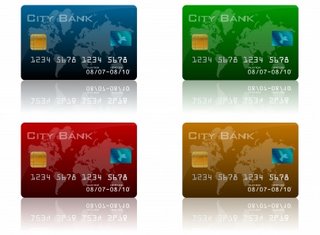 You already know that credit card companies are lowering credit card limits right and left – and we’ve warned you that before you go shopping you need to go on line and make sure you really do have the available credit that you think you have.
You already know that credit card companies are lowering credit card limits right and left – and we’ve warned you that before you go shopping you need to go on line and make sure you really do have the available credit that you think you have.
But now, credit card companies are pulling an even dirtier trick!
According to an article provided to Yahoo finance by SmartMoney.com, some card issuers are now slashing credit card limits to less than your outstanding balance.
You read that right. Many consumers have had their available credit cut to a mere $2 or $3 over their outstanding balance – making them over-limit when the interest was added at the end of the month. Smart consumers called immediately and asked to have the over-limit fee removed, and were successful in doing so, as long as they hurried to make a payment and get the balance low enough to avoid triggering another over-limit fee the next month.
That tactic was outrageous enough, but at least the new credit limit was within range so that consumers could comfortably pay enough to get away from over-limit fees.
But now consumers are reporting cuts that could put some in a position of not being able to bring their balance low enough to avoid future over-limit fees.
The SmartMoney article quotes Paul Pensabene of New York – he received a statement from HSBC on December 8 showing that he had a credit line of $9,000 and owed $359.99 – so his available credit was $8,640. Luckily, he didn’t go shopping, because when he went on line a few days later to pay his bill, he found that his credit line had been reduced to $300 and he had been charged an over-limit fee of $35.
Another woman reported that she had caught the reduction to within $100 of her $3,000 balance on a Discover card when she went on line just days after it had happened. The letter notifying her of the change didn’t arrive until 3 weeks later.
This practice has the potential to bring thousands, if not millions of dollars in over-limit fees to the card issuers who are using it. Consumers who are unaware of the changes may innocently use their cards to charge purchases, while not having any idea that they are exceeding a credit limit. After all, if your statement says you have $8,000 in available credit, you really wouldn’t worry about charging a tank of gas.
Because the new regulations are taking effect in July 2010 and legislation currently in congress could move the time up by a year, card issuers are pulling every trick out of their hats to increase their revenues before these tactics are banned.
The advice for consumers: Be careful. Check every statement, read every piece of mail, and go on line to check available credit each and every time you use your card. If your credit limit is suddenly slashed from $8,000 to $300 and you make an expensive purchase, you could find yourself scrambling for the cash to pay for it – or face over-limit fees each and every month until you do.
My question: When this crisis is over and credit card issuers once again want our business, will we remember the names of the companies who hurried to fleece us while they had the chance? I hope so.
Author:Marte Cliff
CreditScoreQuick.com your resource for free credit reports, credit cards, loans, and ground breaking credit news




